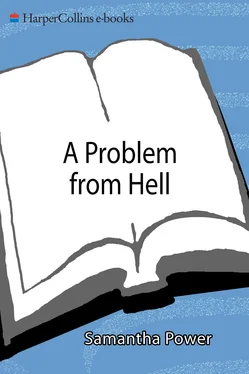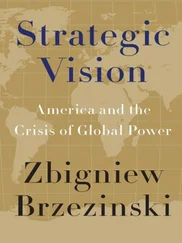A New Beginning, an Old Crusade
Lemkin traveled by train to North Carolina, marking the end of what had been a 14,000-mile journey. The evening he arrived, he was asked to deliver a speech at a dinner with the university president. Without preparation or a full command of English, Lemkin urged Americans to do as Ambassador Morgenthau had done for the Armenians. “If women, children, and old people would be murdered a hundred miles from here,” Lemkin asked, “wouldn’t you run to help? Then why do you stop this decision of your heart when the distance is 3,000 miles instead of a hundred?” 25This was the first of hundreds of speeches Lemkin gave around the state. He bought himself a white suit, white shoes, white socks, and a dark silk tie for his appearances before chambers of commerce, women’s groups, and colleges. Members of the audiences approached Lemkin after his talks and apologized for America’s reluctance to join the fight against Hitler.
While at Duke, Lemkin received a letter from his parents on a scrap of paper a quarter the size of a regular sheet. “We are well,” the letter read. “We hope you are happy. We are thinking of you.” Several days later, on June 24, 1941, he heard a radio broadcaster announce that the German army had declared war on the Soviet Union, abrogating the Molotov-Ribbentrop pact that had divided the country into a German and a Soviet zone. Hitler’s forces were now storming into eastern Poland. Colleagues on campus asked, “Have you heard the news about the Nazis?” Lemkin, dazed and sullen, looked down. “Sorry,” they said, pulling away. 26
Although Lemkin was panicked about the fate of his missing family, he busied himself by proselytizing about Hitler’s crimes. The prevailing wisdom in the United States, as it had been in Lithuania, was that the Nazis were waging a war against Europe’s armies. When Lemkin told U.S. government officials that Germany was also wiping out the Jews, he was greeted either with indifference or incredulity. But with Hitler’s declaration of war against the United States, Lemkin, then fluent in nine languages, thought he might acquire more cachet. In June 1942 the Board of Economic Warfare and the Foreign Economic Administration in Washington, D.C., hired him as chief consultant, and in 1944 the U.S. War Department brought him on board as an international law expert. But his horror stories were not a U.S. governmental concern. “My companions were mildly and only politely interested,” he remembered. “Their attention was rather absorbed by their own assignments…They were masters in switching the discussion in their direction.” 27
Lemkin reached out to those at the top. He met with Henry Wallace, Roosevelt’s vice president, and attempted to personalize his message. Ahead of the meeting, he had studied up on the Tennessee Valley Authority project on irrigation, which he knew would interest Wallace. Because the vice president had been raised in the cornfields of Iowa, Lemkin also slipped in references to his farm upbringing Lemkin met with Wallace on several occasions and introduced his proposals to ban the destruction of peoples. “I looked hopefully for a reaction,” Lemkin remembered. “There was none.” 28
Lemkin next tried to approach President Roosevelt directly. An aide urged him to summarize his proposal in a one-page memo. Lemkin was aghast that he had to “compress the pain of millions, the fear of nations, the hopes for salvation from death” in one page. But he managed, suggesting that the United States adopt a treaty banning barbarity and urging that the Allies declare the protection of Europe’s minorities a central war aim. Several weeks later a courier relayed a message from the president. Roosevelt said he recognized the danger to groups but saw difficulties adopting such a law at the present. He assured Lemkin that the United States would issue a warning to the Nazis and urged patience. Lemkin was livid. “‘Patience’is a good word to be used when one expects an appointment, a budgetary allocation or the building of a road,” he noted. “But when the rope is already around the neck of the victim and strangulation is imminent, isn’t the word ‘patience’ an insult to reason and nature?” 29He believed a “double murder” was being committed—one by the Nazis against the Jews and the second by the Allies, who knew about Hitler’s extermination campaign but refused to publicize or denounce it. After he received word of Roosevelt’s brush-off, Lemkin left the department and walked slowly down Constitution Avenue, trying not to think about what it meant for his parents.
He was sure politicians would always put their own interests above the interests of others. To stand any chance of influencing U.S. policy, he would have to take his message to the general public, who in turn would pressure their leaders. “I realized that I was following the wrong path,” he later wrote. “Statesmen are messing up the world, and [only] when it seems to them that they are drowning in the mud of their own making, [do] they rush to extricate themselves.” 30Those Americans who had been so responsive to Lemkin in person were not making their voices heard. And most Americans were uninterested. Lemkin told himself:
All over Europe the Nazis were writing the book of death with the blood of my brethren. Let me now tell this story to the American people, to the man in the street, in church, on the porches of their houses and in their kitchens and drawing rooms. I was sure they would understand me…I will publish the decrees spreading death over Europe…They will have no other choice but to believe. The recognition of truth will cease to be a personal favor to me, but a log ical necessity. 31
As he lobbied for action in Washington and around the country in 1942 and 1943, he flashed back to a speech delivered by British prime minister Winston Churchill in August 1941, broadcast on the BBC, which had urged Allied resolve. “The whole of Europe has been wrecked and trampled down by the mechanical weapons and barbaric fury of the Nazis…As his armies advance, whole districts are exterminated,” Churchill had thundered. “We are in the presence of a crime without a name.” 32
Suddenly Lemkin’s crusade took on a specific objective: the search for a new word. He replayed in his mind the Churchill speech and the response of the lawyers in Madrid to his proposal. Perhaps he had not adequately distinguished the crime he was campaigning against from typical, wartime violence. Maybe if he could capture the crime in a word that connoted something truly unique and evil, people and politicians alike might get more exercised about stopping it. Lemkin began to think about ways he might combine his knowledge of international law, his aim of preventing atrocity, and his long-standing interest in language. Convinced that it was only the packaging of his legal and moral cause that needed refining, he began to hunt for a term commensurate with the truth of his experience and the experience of millions. He would be the one to give the ultimate crime a name.
Chapter 3 The Crime With a Name
“Believe the Unbelievable”
Although he did not realize it at the time, Lemkin belonged to a kind of virtual community of frustrated, grief-stricken witnesses. A continent away, Szmul Zygielbojm, a fellow Polish Jew, was making arguments similar to those Lemkin registered in the U.S. War Department. In late May 1942, when reports of Nazi terror were still branded “rumors,” Zygielbojm, a member of the Polish National Council in London, released and publicized a report prepared by the underground Jewish Socialist Bund in Poland. For the previous two years, Zygielbojm had been traveling around Europe and the United States describing ghastly conditions in occupied Poland, but the Bund report offered the most complete, precise, and chilling picture of Hitler’s extermination plot. The Nazis had dispatched Einsatzgruppen, or mobile killing units, to conquered territory in eastern Europe. In Lithuania and Poland in the summer of 1941, the Bund reported,
Читать дальше












